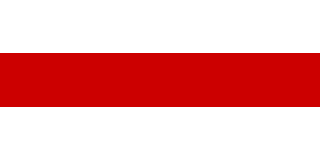| |||||
| Decades: | |||||
|---|---|---|---|---|---|
| See also: | |||||
The following lists events in the year 2017 in Belarus .
| |||||
| Decades: | |||||
|---|---|---|---|---|---|
| See also: | |||||
The following lists events in the year 2017 in Belarus .


Belarus, officially the Republic of Belarus, is a landlocked country in Eastern Europe. It is bordered by Russia to the east and northeast, Ukraine to the south, Poland to the west, and Lithuania and Latvia to the northwest. Belarus spans an area of 207,600 square kilometres (80,200 sq mi) with a population of 9.1 million, The country has a hemiboreal climate and is administratively divided into six regions. Minsk is the capital and largest city; it is administered separately as a city with special status.
The lands of Belarus during the Middle Ages became part of Kievan Rus' and were split between different regional principalities, including Polotsk, Turov, Vitebsk, and others. Following the Mongol invasions of the 13th century, these lands were absorbed by the Grand Duchy of Lithuania, which later was merged into the Polish–Lithuanian Commonwealth in the 16th century.

Minsk is the capital and the largest city of Belarus, located on the Svislach and the now subterranean Niamiha rivers. As the capital, Minsk has a special administrative status in Belarus and is the administrative centre of Minsk Region and Minsk District. As of 2024, it has a population of about two million, making Minsk the 11th-most populous city in Europe. Minsk is one of the administrative capitals of the Commonwealth of Independent States (CIS) and the Eurasian Economic Union (EAEU).

Alexander Grigoryevich Lukashenko is a Belarusian politician who has been the president of Belarus since the office's establishment in 1994, currently the longest in Europe.

Lesbian, gay, bisexual, and transgender (LGBT) people in Belarus face significant challenges not experienced by non-LGBT residents. Although same-sex sexual activity is legal in Belarus, gay and lesbian rights in the country are otherwise severely limited and homosexuality remains highly stigmatized in Belarusian society. Households headed by same-sex couples are not eligible for the same legal protections available to opposite-sex couples. Belarus provides no anti-discrimination protections for LGBT people, nor does it prohibit hate crimes based on sexual orientation and gender identity. Many Belarusian people believe that homosexuality is a psychiatric illness, and many LGBT persons in Belarus tend to hide their sexual orientation in public. Those who are "out" face harassment, violence and physical abuse.

Freedom Day is an unofficial holiday in Belarus celebrated on 25 March to commemorate the declaration of independence by the Belarusian Democratic Republic by the Third Constituent Charter on that date in 1918. It is also known as the 25-aha sakavika day.

The State Security Committee of the Republic of Belarus is the national intelligence agency of Belarus. Along with its counterparts in Transnistria and South Ossetia, it kept the unreformed name after declaring independence.

Presidential elections were held in Belarus on 19 March 2006. The result was a victory for incumbent, President Alexander Lukashenko, who received 84.4% of the vote. However, Western observers deemed the elections rigged. The Organization for Security and Co-operation in Europe (OSCE) declared that the election "failed to meet OSCE commitments for democratic elections". In contrast, election observers from the Commonwealth of Independent States (CIS) described the vote as open and transparent.

The Jeans Revolution was a term used by Belarus' democratic opposition to describe their protests following the 2006 Belarusian presidential election.

Belarus and Ukraine are both are full members of the Baku Initiative and Central European Initiative. In 2020, during the Belarusian protests against president Lukashenko, the relationship between Ukraine and Belarus began to deteriorate, after the Ukrainian government criticized Belarusian president Alexander Lukashenko. In the waning days of 2021, the relationship between both countries rapidly deteriorated, culminating in a full-scale invasion on 24 February 2022. Belarus has allowed the stationing of Russian troops and equipment in its territory and its use as a springboard for offensives into northern Ukraine but has denied the presence of Belarusian troops in Ukraine. Even though part of the Russian invasion was launched from Belarus, Ukraine did not break off diplomatic relations with Belarus, but remain frozen.

The government of Belarus is criticized for its human rights violations and persecution of non-governmental organisations, independent journalists, national minorities, and opposition politicians. In a testimony to the United States Senate Committee on Foreign Relations, former United States Secretary of State Condoleezza Rice labeled Belarus as one of the world's six "outposts of tyranny". In response, the Belarusian government called the assessment "quite far from reality". During 2020 Belarusian presidential election and protests, the number of political prisoners recognized by Viasna Human Rights Centre rose dramatically to 1062 as of 16 February 2022. Several people died after the use of unlawful and abusive force by law enforcement officials during 2020 protests. According to Amnesty International, the authorities didn't investigate violations during protests but instead harassed those who challenged their version of events. In July 2021, the authorities launched a campaign against the remaining non-governmental organizations, liquidating at least 270 of them by October, including all previously registered human rights organizations in the country.

Belarus and Israel established diplomatic relations in 1992. In 1947, Belarus voted in favor for the United Nations Partition Plan for Palestine. Belarus operates an embassy in Tel Aviv, while Israel operates an embassy in Minsk. Around 130,000 Belarusian citizens immigrated to Israel during the 1990s under the Law of Return.

The Belarusian opposition consists of groups and individuals in Belarus seeking to challenge, from 1988 to 1991, the authorities of Soviet Belarus, and since 1995, the leader of the country Alexander Lukashenko, whom supporters of the movement often consider to be a dictator. Supporters of the movement tend to call for a parliamentary democracy based on a Western model, with freedom of speech and political and religious pluralism.

The 2011 Belarusian protests were a series of peaceful protests by demonstrators in Belarus demanding the resignation of current Belarusian president Alexander Lukashenko, who had been the president of Belarus since 1994. Belarus is an authoritarian state, and in May 2011 presidential candidate Andrei Sannikov was sentenced to five years in prison for taking part in the 2010 presidential election. Lukashenko claimed he won with almost 80% of the vote.
Minsk Pride is a gay pride parade in Minsk, Belarus. This is a festival in support of tolerance for gays, lesbians, bisexuals and transgender people in Belarus.

The 2017 Belarusian protests were a series of demonstrations and street protests against President Alexander Lukashenko that broke out in late February 2017. Protesters mobilized against a tax levied against the unemployed in Belarus. Demonstrations and marches were held in sites throughout the country with sizes of several hundred to several thousand gathering at a given time.
Events in the year 2020 in Belarus.

The 2020–2021 Belarusian protests were a series of mass political demonstrations and protests against the Belarusian government and President Alexander Lukashenko. The largest anti-government protests in the history of Belarus, the demonstrations began in the lead-up to and during the 2020 presidential election, in which Lukashenko sought his sixth term in office. In response to the demonstrations, a number of relatively small pro-government rallies were held.

Revolutionary Action is the oldest Belarusian anarchist organization. It seeks to spread anarchist ideas, organize a movement of direct action, and foment a social revolution in Belarus. The group promotes social anarchism, anarcho-communism, and illegalism, and operates in secret due to laws that criminalize their activities.

The 2010 Belarusian protests were mass protest actions in Belarus against the results of the 2010 Belarusian presidential election, which took place on December 19, 2010 and were brutally dispersed. Between 10,000 and 60,000 people took part in the protest on October Square and Independence Square in Minsk. It was announced that a people's movement for free elections would be created without Lukashenka. Some participants tried to break into the Government House. Clashes with riot police took place. As a result, dozens of people were detained and beaten, including presidential candidates Khaklyaeu, Sannikov, Kastusyou, Statkevich, and Rymasheuski.